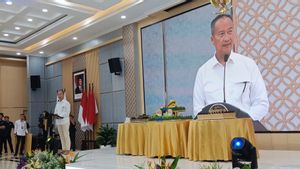JAKARTA - The Indonesian government's move to move the nation's capital, from DKI Jakarta to East Kalimantan, received foreign media attention along with the ratification of the State Capital Bill into Law last Tuesday.
The reason for the relocation is because DKI Jakarta's burden is too heavy to be drowned, the choice of the name Nusantara, the mention of the name Basuki Tjahaja Purnama (Ahok) and concerns about the environmental impact were mentioned by the foreign media.
Reuters in an article entitled 'Indonesia passes law to relocate capital to Borneo jungle' Wednesday, January 19, said the Indonesian Parliament on Tuesday approved a bill to move Indonesia's capital city from Jakarta to a location deep in the jungle on the island of Borneo.
Reuters said the initial relocation would begin between 2022 and 2024, with roads and ports prioritized to allow access, with some projects operating as public-private partnerships, the finance ministry said.
Plans to move the government away from Jakarta, a huge city of 10 million people suffering from chronic congestion, flooding and air pollution, have been floated by many presidents, but none have made it this far.
In the same article, Reuters said the move would strengthen supply chains and put Indonesia in a more strategic position in world trade routes, investment flows and technological innovation, the government said in a statement.
Indonesia passes law to relocate capital to remote Borneo https://t.co/g7UUYPKMxv pic.twitter.com/aun5jaCMFi
— Reuters (@Reuters) January 18, 2022
Southeast Asia's largest economy has envisioned the new capital city as a low-carbon "super hub" that will support the pharmaceutical, healthcare and technology sectors and drive sustainable growth beyond Java.
Reuters also wrote that with the nation's capital to be led by a head of authority equivalent to a minister, one being considered for the position is the former governor of Jakarta, Basuki Tjahaja Purnama, better known as Ahok.
Meanwhile in an article titled 'Indonesia a step closer to moving capital city as Jakarta sinks', Deutsche Welle (DW) wrote that the Indonesian Legislative Body on Tuesday passed a law that creates a legal framework for moving the nation's capital from Jakarta, the major city that has sunk. , dense, polluted and prone to flooding with more than 10 million inhabitants, to the jungles of Borneo, in the Indonesian part of the island. Borneo, about 2,000 kilometers (1,200 mi) away.
DW wrote the move was seen as unavoidable, as the greater Jakarta area grows to more than 30 million inhabitants and environmentalists warn that a third of the city could be underwater by 2050.
In the report, DW also said that while proponents have highlighted the positives of the move, critics say the mega-project further threatens Borneo's rainforests, which are already under attack by the country's mining and palm oil industries, and the endangered species that inhabit them.
DW said no timeframe had yet been set for the finalization of the project, and Jakarta would remain Indonesia's capital until a presidential decree was issued to formalize the move.
BREAKING | Indonesia to name new capital city 'Nusantara'https://t.co/Nhv0lT6kEw#Indonesia #Nusantara #jokowi
— Nikkei Asia (@NikkeiAsia) January 18, 2022
Next, British media The Guardian in a report entitled 'Indonesia names new capital Nusantara, Replacing sinking Jakarta' stated that Indonesia plans to name its new capital city Nusantara, which translates as "archipelago", when government offices are moved to the province of East Kalimantan from Jakarta. , on the island of Java.
The Guardian writes that some have pointed out that the choice can be confusing because Nusantara is also used to refer to the island nation as a whole. Others have questioned why Nusantara, an ancient Javanese term, was chosen when the new capital city was being built in Kalimantan.
The Guardian also wrote that by moving the capital, the government also hopes to redistribute wealth. Java is home to 60 percent of the country's population and more than half of its economic activity, although Kalimantan is almost four times as large.
Meanwhile, the foreign media BBC in its report entitled 'Indonesia names new capital that will replace Jakarta' wrote, Indonesia has announced that its new capital city will be called Nusantara, which means "archipelago" in Javanese. It came when parliament approved a bill to move the capital from Jakarta, which quickly sank.
The BBC says Jakarta is becoming overcrowded, polluted and sinking at an alarming rate due to excessive groundwater extraction. Home to more than 10 million people, it is located in marshy land on the large island of Java. Air pollution and traffic jams in this city are very well known. Government ministers had to be escorted by police convoys to get to the meeting on time.
The BBC also writes that Indonesia is not the first country to change its capital city, with Brazil, Pakistan and Nigeria cited as examples of countries that have moved their capitals to planned and built areas.
Indonesia has named its new capital Nusantara, as lawmakers approve the shift from Jakarta to Kalimantan -- a jungle-covered area on the east of Borneo island https://t.co/4JVi8AdFGL
— CNN International (@cnni) January 18, 2022
In addition to the media above, the spotlight also came from other foreign media such as The Washington Post, Al Arabiya, Nikkei Asia, CNN to The Straits Times and the South China Morning Post.
As previously reported, the Indonesian House of Representatives ratified the Draft Law on the State Capital (RUU IKN) into law. The approval was decided in a plenary session last Tuesday.
All points contained in the IKN Bill have been agreed, such as the new IKN in the form of a provincial-level authority until the new IKN leader is the head of the authority. And the name of IKN is Nusantara.
"There were more than 80 names proposed, but the President (Joko Widodo) chose Nusantara without the word Jaya," explained the Minister of National Development Planning/Head of Bappenas Suharso Monoarfa at the Working Meeting of the Special Committee on the Draft Law on the State Capital (RUU IKN) in the Complex Parliament, Jakarta, citing Antara 17 January.
The English, Chinese, Japanese, Arabic, and French versions are automatically generated by the AI. So there may still be inaccuracies in translating, please always see Indonesian as our main language. (system supported by DigitalSiber.id)













